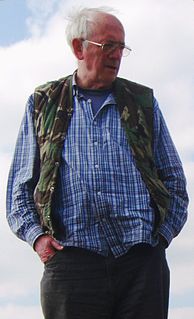A Quote by Edgar Mitchell
The ancients had a term in the mystical tradition called the Akashic Records, which was suggestive that nature didn't lose it's experience, that the information accumulated was available forever.
Quote Topics
Related Quotes
By inner experience I understand that which one usually calls mystical experience: the states of ecstasy, of rapture, at least of meditated emotion. But I am thinking less of confessional experience, to which one has had to adhere up to now, that of an experience laid bare, free of ties, even of an origin, of any confession whatever. This is why I don't like the word mystical.
Every individual is at once the beneficiary and the victim of the linguistic tradition into which he has been born - the beneficiary inasmuch as language gives access to the accumulated records of other people's experience, the victim in so far as it confirms him in the belief that reduced awareness is the only awareness and as it bedevils his sense of reality, so that he is all too apt to take his concepts for data, his words for actual things.
Visionary experience is not the same as mystical experience. Mystical experience is beyond the realm of opposites. Visionary experience is still within that realm. Heaven entails hell, and 'going to heaven' is no more liberation than is the descent into horror. Heaven is merely a vantage point from which the divine Ground can be more clearly seen than on the level of ordinary individual experience.
We receive experience from nature in a series of messages. From these messages we extract a content of information: that is, we decode the messages in some way. And from this code of information we then make a basic vocabulary of concepts and a basic grammar of laws, which jointly describe the inner organization that nature translates into the happenings and the appearances we meet.
Poetic experience is distinct in nature from mystical experience. Because poetry emanates from the free creativity of the spirit,it is from the very start oriented toward expression, and terminates in a word proffered, it wants to speak; whereas mystical because it emanates from the deepest longing of the spirit bent on knowing, tends of itself toward silence and internal fruition. Poetic experience is busy with the created world and the enigmatic and innumerable relations of existents with one another, not with the Principle of Being.
While often being called transdisciplinary, theonomous reasoning is actually a first step back to ancient wisdom in which methodological sensation [or what we now know as science] has completely merged with methodological revelation [or totally known mystical knowledge in which every aspect of the occult has been overcome]. A true tradition has no occult or hidden phases left in its process. The creators and the audience are in perfect harmony.































